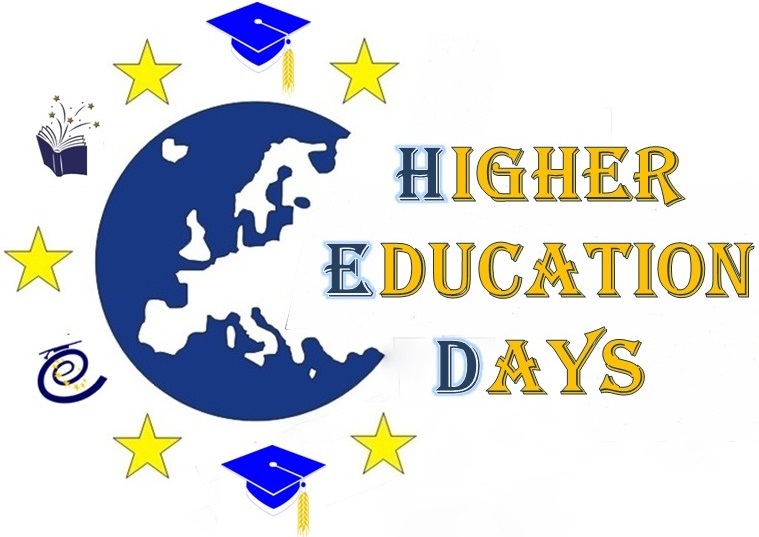For sure, the biggest and the most successful project in the history of AEGEE is the Summer University Project (SU). A project that best fits to our association aim for promoting co-operation, communication and integration amongst young people in Europe. A project that strives for unified Europe, cross boarder cooperation and tolerance.
Is this what you have been thinking when you decided to apply for your last SU?
Is this what you have been thinking when you decided to dedicate your summer vacation for organizing the best SU ever? Maybe or maybe not.
Personally my answer would be NO! Or at least I would not try to express it as for an official AEGEE presentation. When I decide to go to a SU or to organize a SU, the picture in my mind that appears is young crazy people, ready to have great party and to see new places, taste new things experience new feelings or even people!
Well, this was till this summer! When I went in Spain for the collaboration between the “Higher Education Days” (HED) project and the Summer Events of AEGEE-Leon and AEGEE-Tarragona. This was the most not so “formal” way of involving the non-formal education (NFE) into HED project. In a way we decided to try to change our target and to make work more for the understanding of the NFE inside AEGEE but in one cool, provocative and interactive way.
The main idea was an introduction with NFE and its overall understanding by both participants on one side, and labor market and universities on the other side. During the 9 days of the SUs participants had the opportunity not only to see the beauties of amusing Spain and party endlessly under the ESpanish sky (or in some moments water sky), but also feed their brains with values and skills important to a young European worker. Through practical approach they were able to improve their communication skills, discuss about the common stereotypes, intercultural understanding and learn the meaning of cooperation and teamwork. What most surprised me was that the participants were much more than punctual for a SU and moreover – they were actively participating! It was more than a pleasure not only to see locals ready to mix they SU with a project that more or less not so easy to be understand for all AEGEE members, working and asking for HED opinion for little details part of the preselection and organization, but also to see smiling and awake participants (even after the European night) ready to collaborate in our workshops.
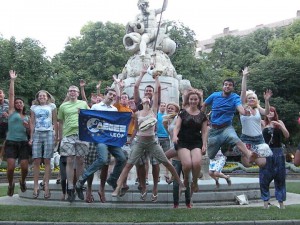 Why we choose exactly to use non formal learning? Simply because the NFE aims at giving young people the tools to further develop their skills and attitudes. And somehow this is what is special for the NFE – individuals, participants are the actors actively involved in the “learning” process. What better could be for a SU? What better would be for AEGEE? As this is what we all are keep on developing in one or another way every day inside AEGEE!
Why we choose exactly to use non formal learning? Simply because the NFE aims at giving young people the tools to further develop their skills and attitudes. And somehow this is what is special for the NFE – individuals, participants are the actors actively involved in the “learning” process. What better could be for a SU? What better would be for AEGEE? As this is what we all are keep on developing in one or another way every day inside AEGEE!
As I said in Tarragona our life is like a school. Every day we take our classes, develop ourselves, enrich our knowledge and virtues. We get promoted to the next level, the next class, by fulfilling one simple goal: knowledge, improvement and perfection! But even if we make a mistake, we are supposed to learn from it, to be grateful for the opportunities and of course never, ever, give up! NFE is the final ingredient that gives you the possibility to be full and to feel satisfied with what you are doing, with YOURSELF, to be satisfied with life!
Thank you AEGEE-Leon & AEGEE-Tarragona for changing my definition for a Summer University in AEGEE, for putting much more sense in it!
I do offer you another perspective for this summer HED collaboration, too! Just check it below!
Pavel Zbornik, president of AEGEE-Praha:
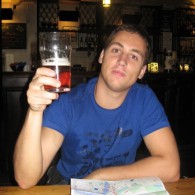 “I have some experience with NFE, being on several trainings, organizing SALTO training in Prague and lastly NFE experience from SU in Tarragona. It was nice combination of serious discussion with fun part so involved participants get knowledge in interesting way. Thanks to that I got new information in cultural understanding which enriched me and now I understand bit more to my internationals friends.”
“I have some experience with NFE, being on several trainings, organizing SALTO training in Prague and lastly NFE experience from SU in Tarragona. It was nice combination of serious discussion with fun part so involved participants get knowledge in interesting way. Thanks to that I got new information in cultural understanding which enriched me and now I understand bit more to my internationals friends.”
Annika Lüdeking, president of AEGEE-Heidelberg:
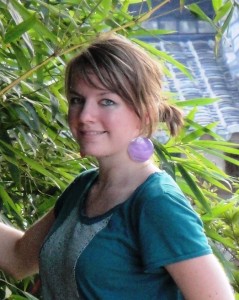 “I do think that Non-Formal Education is very important for everybody, especially as we dealt with cultural understanding which is crucial for the teamwork in our network. Everybody learns non-formally already by observing his/her surrounding and by talking to other people and often we need some kind of reflection to fully understand the gained impressions and stories. Therefore we as Aegeeans should support our Higher Education Days and participate in some workshop or lessons provided and pass on the knowledge to our antennas. Personally I would have liked to go deeper and learn even more about have to overcome cultural borders, as we only scratched on the surface during our Summer University.”
“I do think that Non-Formal Education is very important for everybody, especially as we dealt with cultural understanding which is crucial for the teamwork in our network. Everybody learns non-formally already by observing his/her surrounding and by talking to other people and often we need some kind of reflection to fully understand the gained impressions and stories. Therefore we as Aegeeans should support our Higher Education Days and participate in some workshop or lessons provided and pass on the knowledge to our antennas. Personally I would have liked to go deeper and learn even more about have to overcome cultural borders, as we only scratched on the surface during our Summer University.”
Tünde Ress, a member of AEGEE-Piliscsaba:
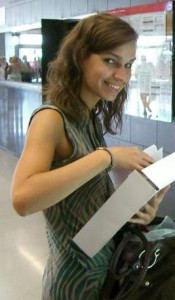 “My first and only experience with Non-Formal Education and Higher Education Days Project was in the Summer University in Tarragona. Although we discussed obvious things about this theme, after all it was really interesting and exciting. Because you had to express your thoughts about this serious theme in other language and you could talk about it with young people from other countries and maybe you hadn’t had the chance for it before. Thanks to the team works and games it wasn’t boring at all. I liked the idea that such people gave the presentations about for example stereotypes that actually studied psychology and knew about this things even more. I have taught a lot about this theme and I’m really glad to have known other young people from foreign countries who participated and showed own culture and habits through these trainings. Totally worth it!”
“My first and only experience with Non-Formal Education and Higher Education Days Project was in the Summer University in Tarragona. Although we discussed obvious things about this theme, after all it was really interesting and exciting. Because you had to express your thoughts about this serious theme in other language and you could talk about it with young people from other countries and maybe you hadn’t had the chance for it before. Thanks to the team works and games it wasn’t boring at all. I liked the idea that such people gave the presentations about for example stereotypes that actually studied psychology and knew about this things even more. I have taught a lot about this theme and I’m really glad to have known other young people from foreign countries who participated and showed own culture and habits through these trainings. Totally worth it!”
Eduardo Di Mauro, a member of AEGEE-Tarragona:
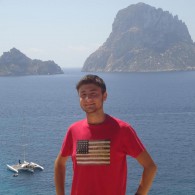 “I think that Non Formal education is important because it lets people learn in a way suited to their attitudes. In my opinion NFE is valuable for such a student association like AEGEE, since it is a valid, effective and practical tool for students to teach to other students (more or less of the same age) remarkable matters. (For example last week I wrote to one of the “teachers”, Adela, a question about assertive communication, confirming that the lessons were not useless). It would be great to recognize it but since it does not include any exam, I can understand if institutions fear to give their approval to that (people could just go to a NFE lessons, never talk and finally get some kind of paper). During the HED experience, the workshops were useful in my opinion, since everybody was giving his contribution, depending on their interest in the subject. It is normal that everybody has a different level of interest, but in this sense it is important to create a group of people that all have the same will to contribute to the workshops.”
“I think that Non Formal education is important because it lets people learn in a way suited to their attitudes. In my opinion NFE is valuable for such a student association like AEGEE, since it is a valid, effective and practical tool for students to teach to other students (more or less of the same age) remarkable matters. (For example last week I wrote to one of the “teachers”, Adela, a question about assertive communication, confirming that the lessons were not useless). It would be great to recognize it but since it does not include any exam, I can understand if institutions fear to give their approval to that (people could just go to a NFE lessons, never talk and finally get some kind of paper). During the HED experience, the workshops were useful in my opinion, since everybody was giving his contribution, depending on their interest in the subject. It is normal that everybody has a different level of interest, but in this sense it is important to create a group of people that all have the same will to contribute to the workshops.”
Liliya Toneva, a member of AEGEE-Sofia:
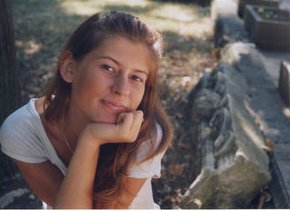 “As participant at the Summer University in Tarragona I had the great possibility to learn more about the non-formal education. In my opinion non-formal education is and should be main part of the HED project. Non-formal and informal education become more and more important nowadays. Because we learn everywhere and at all times and this experience leads to additional skills, knowledge and competences. I strongly believe that, all of us in AEGEE should work for the recognition of non-formal and also informal education.
“As participant at the Summer University in Tarragona I had the great possibility to learn more about the non-formal education. In my opinion non-formal education is and should be main part of the HED project. Non-formal and informal education become more and more important nowadays. Because we learn everywhere and at all times and this experience leads to additional skills, knowledge and competences. I strongly believe that, all of us in AEGEE should work for the recognition of non-formal and also informal education.
“And maybe we are like example of how it works.”
That was just an example how the participants took active role in their environment and contributed to the local student society. This was just another example how AEGEE promote European Integration ……..and may be something more!
Though I still have the question in my mind when we will realise that we are really build bridges for learning – once with the value of the NFE and twice with its recognition?
by me,
Diana Yolova,
AEGEE member !
written by Diana Yolova, Higher Education Days Project


